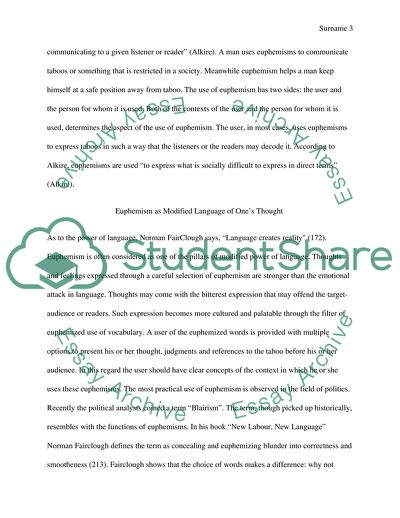Cite this document
(Euphemism: A Technique of Expression Case Study, n.d.)
Euphemism: A Technique of Expression Case Study. https://studentshare.org/english/1718433-english-language-question-discuss-what-euphemisms-are-and-why-they-are-used-your-ideas-should-be-anchored-in-a-discussion-of-the-relationship-between-language-and-thought
Euphemism: A Technique of Expression Case Study. https://studentshare.org/english/1718433-english-language-question-discuss-what-euphemisms-are-and-why-they-are-used-your-ideas-should-be-anchored-in-a-discussion-of-the-relationship-between-language-and-thought
(Euphemism: A Technique of Expression Case Study)
Euphemism: A Technique of Expression Case Study. https://studentshare.org/english/1718433-english-language-question-discuss-what-euphemisms-are-and-why-they-are-used-your-ideas-should-be-anchored-in-a-discussion-of-the-relationship-between-language-and-thought.
Euphemism: A Technique of Expression Case Study. https://studentshare.org/english/1718433-english-language-question-discuss-what-euphemisms-are-and-why-they-are-used-your-ideas-should-be-anchored-in-a-discussion-of-the-relationship-between-language-and-thought.
“Euphemism: A Technique of Expression Case Study”. https://studentshare.org/english/1718433-english-language-question-discuss-what-euphemisms-are-and-why-they-are-used-your-ideas-should-be-anchored-in-a-discussion-of-the-relationship-between-language-and-thought.


